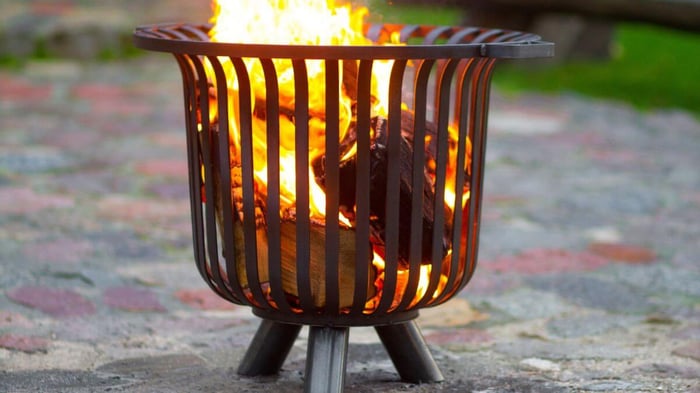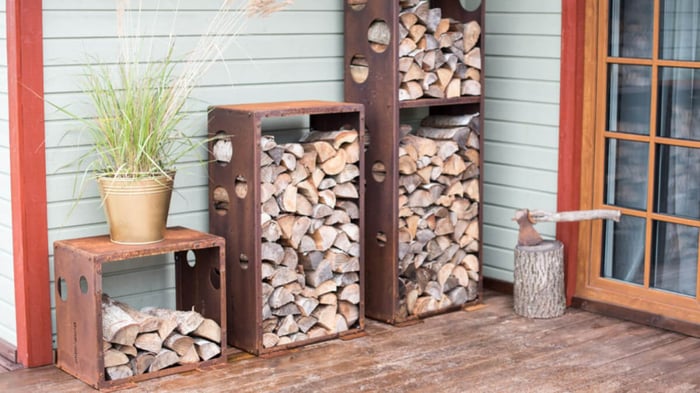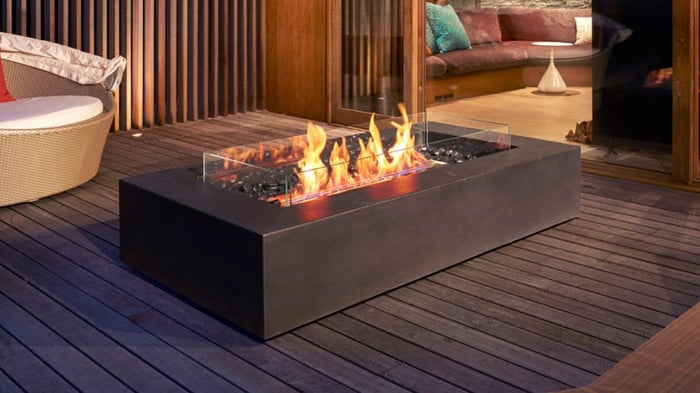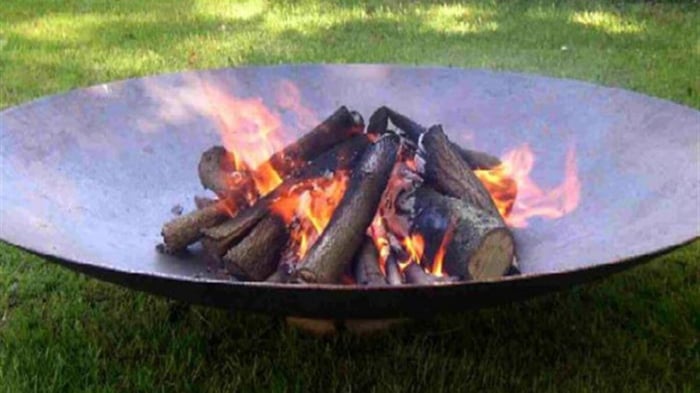Is Burning Wood Outside Legal in the UK? Given that there is an entire day on the 5th of November dedicated to doing just that, it's safe to say that burning wood outdoors is legal here in the UK (though with some key restrictions!), and there is no shortage of outdoor fires happening all over the country.
Most people who burn wood outdoors usually do so from the comfort of home, typically relaxing in the garden by a stylish fire pit or chimenea with friends and family.
Some even like to cook up a feast, create delicious food in a smoker or pizza oven, and stay warm and well-fed at the same time!
However, most people burning wood outdoors rarely consider whether it is legal.
As burning wood creates a few hazards, namely smoke and fire damage, it is reasonable to expect some restrictions regarding how you burn wood outdoors.
So, let's take a closer look at whether burning wood outdoors is legal in the UK!
Is Burning Wood Outside Legal in the UK?
Yes, in most instances, burning wood outdoors is legal in the UK. There are almost no restrictions if you plan on burning wood in a fire pit, chimenea, or outdoor fireplace in your garden.
Any restrictions are typically for Smoke Controlled Areas with unique bylaws; even these are lenient when burning wood outdoors on your property.
For example, Smoke Control Areas restrict what you can burn out of a chimney, although burning wood outside on a fire pit is usually still permitted.
If you are unsure if you live in a smoke-controlled Area, contact your local council or a quick internet search for the environmental officer in your local council should point you in the right direction.
There are very few legal restrictions even if you live in a smoke-controlled area, but always sensible to check and make sure.
What are the Rules for Burning Wood Outdoors?
The UK government is lenient regarding outdoor bonfires, especially in a private home, assuming you follow some basic guidelines.
Most of this is common sense, like not burning household waste that causes pollutants.
Plastic, flammable liquids (outside of regulated ones like liquid propane or bioethanol), paints and oils all give off some hazardous toxins when burned and are completely off-limits, so please don't be tempted to throw them on top of the fire.
Is Burning Treated Wood Illegal?
While burning treated wood may not be illegal on its own. There is a huge risk that it will be.
Painted or treated wood will have additional chemicals; burning this wood could give off dangerous toxic fumes and increase the smoke released.
Old-painted wood is hazardous as it may contain lead-based paint.
Our advice is DO NOT burn treated wood; it is hazardous and could be illegal.
What are the Legal Implications of Excessive Smoke from Garden Fires?
You must be mindful of how much smoke you produce, burning wood outdoors and where that smoke drifts off.
It might be tempting but unwise to burn garden waste; this waste usually generates considerable smoke and can quickly become a nuisance; always recycle garden waste and never burn it.
This is particularly pertinent if you live near a main road, as there are laws preventing fires that produce smoke that may drift across public roads.
If smoke from a wood-burning fire blows over and becomes a danger to motorists, you could face a fine, especially for repeated offences.
So, if you're burning wood in a garden that is near a road, make sure to reduce the amount of smoke from the fire, and you should be okay. Here are some tips for reducing fire pit smoke if this applies to you!
What Does The Law Say?
Burning wood outdoors can generate smoke that has the potential to cause a nuisance to your neighbours.
If your neighbours are persistently affected by smoke from your property, they may file a complaint with your local council.
Councils must investigate complaints about the smoke that may be a "statutory nuisance" under the Environmental Protection Act 1990.
Smoke may be considered a statutory nuisance if it unreasonably and substantially interferes with the use or enjoyment of a home or other premises or if it injures health or is likely to harm health.
Suppose councils determine that a statutory nuisance exists. In that case, they must serve an abatement notice requiring the person responsible for stopping or restricting the smoke.
Unless exempt, all smoke from residential, business, and industrial premises is covered by statutory nuisance laws. Environmental health officers usually assess whether smoke is a statutory nuisance by considering the activity's amount, frequency, duration, and unreasonableness.
Your council may eventually impose a fine if the issue persists.
Check out the UK government's advice on smoke-controlled areas for more reading.
-
UK government's guidance on garden bonfires: https://www.gov.uk/garden-bonfires-rules
-
The Environmental Protection Act 1990: https://www.legislation.gov.uk/ukpga/1990/43/contents
-
The Clean Air Act 1993: https://www.legislation.gov.uk/ukpga/1993/11/contents
Additionally, local councils or authorities may have their own bylaws or regulations for using garden fire pits.
It is recommended to check with your local council or authority for more information on any restrictions that may apply in your area. In nearly all cases, either no bylaws restrict or are very lenient for a garden fire pit.
Post Code Checker
Using a wood burner outside is legal; being a nuisance with an outdoor fire can cause problems with the neighbours and the local council. Here is our local council checker for their guidelines.
This is currently for postcodes in England and Wales. It will soon expand to Scotland and Northern Ireland.
Be Considerate Of Your Neighbours
We know it sounds obvious, but being a considerate neighbour and choosing a suitable place for the fire that isn't too close to someone else's property eliminated the risk of this being a problem.
Also, reducing the amount of smoke the fire products can be a great way to avoid tension with neighbours.
For example, maybe consider a chimenea or an outdoor fireplace that funnels the smoke away or choose a suitable wood to avoid creating too much smoke.
If you are on private or public property, then just make sure to ask for permission. Otherwise, you could face a fine or prosecution.
Most public areas are owned by the local council, so contact them if you plan to burn wood outdoors away from home.
Safety Measures to Have In Place
When burning wood outdoors, it's vital that you stay safe as well as legal with what you are doing.
Operating your fire pit safely isn't arduous; there are just some key things to remember:
-
Don't have your fire pit too close to any building
-
Don't make your fire too big
-
Don't light a fire if it is too windy
-
Make sure you have water/sand on hand to put the fire out quickly
-
Fire grates or shields are always a good idea, especially if you have kids or animals around
What Alternatives Are There?
We love wood-burning fire pits; watching the flickering flame is hypnotic and just creates wonderful warmth and an occasion.
But we know they may not be right for all and every garden. Why not consider some alternatives? There are many great alternatives.
Various types of fire pits are available, such as gas fire pits that use natural gas or propane, eco-friendly bioethanol fire pits, and traditional patio heaters.
Final Thoughts: Is Burning Wood Outside Legal?
Yes, as long as you aren't producing smoke drifting onto public roads and interfering with motorists. You will be fine if you're only burning wood, not throwing old plastic bags on, and are generally considerate of your neighbours.
Sitting around a gorgeous roaring fire pit, the wood crackling reassuringly as you while away the night with some good company. Well, there's nothing better than that, is there?
Subscribe to our email
Enter your email address below for a monthly email with links to all the latest blog posts. Simple unsubscribe at any time.








